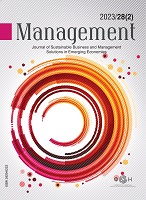Working from Home, Work-Related Attitudes, Work-Life Balance and Employee Well-Being – Implications for HRM in the Post-COVID Era
Working from Home, Work-Related Attitudes, Work-Life Balance and Employee Well-Being – Implications for HRM in the Post-COVID Era
Author(s): Biljana Bogićević Milikić, Ana Aleksić Mirić, Nebojša JanićijevićSubject(s): Economy, Business Economy / Management, Human Resources in Economy
Published by: Fakultet organizacionih nauka Univerziteta u Beogradu (FON)
Keywords: Working from Home; Work-Related Attitudes; Work-Life Balance; Employee Well-Being; Post-Covid Era; Human Resource Management
Summary/Abstract: Research Question: This paper explores the relationship between working from home, work-related attitudes, work-life balance and employee well-being. Motivation: The paper is inspired by an evident lack of research of factors that possibly cause differences in the employees` work-related attitudes, work-life balance and employee well-being especially in the Covid Era. In this paper, we search for a better understanding of the relationship between working from home, work-related attitudes, work-life balance and employee well-being. Idea: The paper aims to identify factors that make a difference in certain work-related attitudes (job satisfaction and organizational commitment), work-life balance and employee well-being in working from home environment in order to provide for better understanding of employees` behaviour in the Covid Era and the implications for more effective Human Resource Management of working from home employees in Post-Covid time. Data: Primary data were collected through a questionnaire with 2,171 employees, over the period from the end of March till the beginning of May 2021. The sample included only respondents who have experienced working from home from the beginning of the Covid 19 pandemic in Serbia. Tools: Statistical analysis was performed (using descriptive stats, t-test for testing equality of means, chi-square test and ANOVA, and some non-parametrical tests). Findings: Preliminary findings signify a lack of previous experience in applying the working from home practice; an increase in the length of working hours; some resistance to working from home; most employees would choose a balance in which office work dominates, but there is also work from home, at least one day a week; the dominant majority of employees report feeling cheerful and moody, calm and relaxed and active and energetic when working from home, while slightly different results are recorded in the field of physical well-being; overall work-life balance is not interrupted. Contribution: This paper contributes to the research of factors of work-related attitudes, work-life balance and employee well-being while working from home by bringing original field data from Serbia. From the standpoint of HR policies and practices, it offers valuable implications for managers working in post-Covid Era.
Journal: Management: Journal of Sustainable Business and Management Solutions in Emerging Economies
- Issue Year: 28/2023
- Issue No: 2
- Page Range: 13-22
- Page Count: 10
- Language: English

